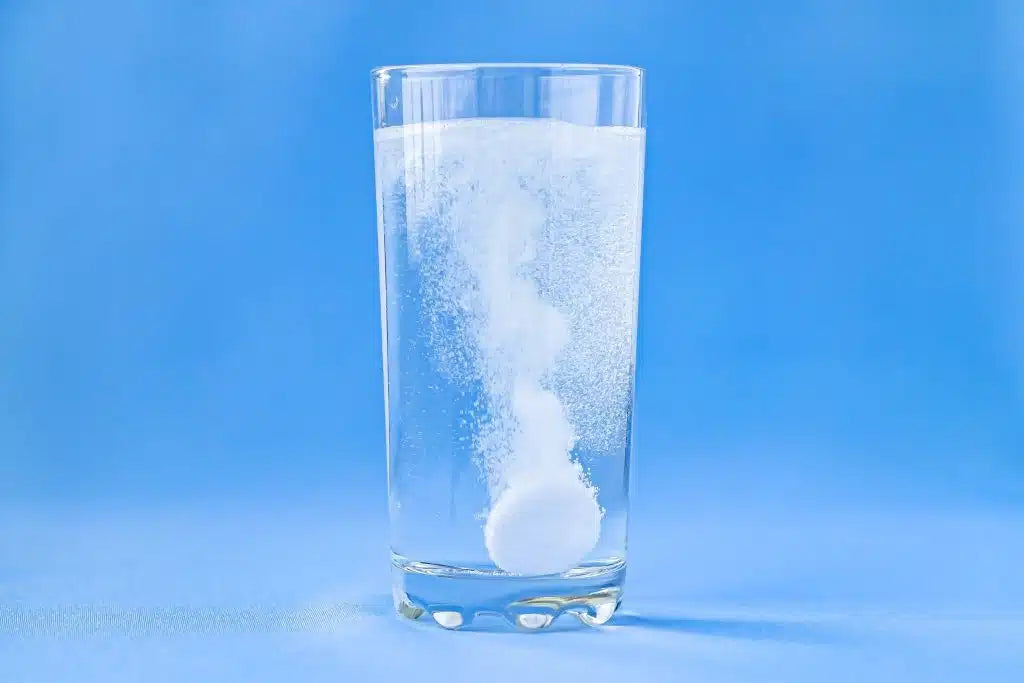Proactive biohackers are picking up on a new health trend – hydrogen water. Proponents claim that drinking hydrogen water can improve hydration, boost energy and mood, and enhance athletic performance – but what does the research say? Does hydrogen water live up to the hype?
In this blog, we’ll discuss the emerging science behind hydrogen water, the potential health benefits of this unique beverage, and how to incorporate hydrogen water into your wellness routine.
What is Hydrogen Water?
All water molecules contain two hydrogen atoms and one oxygen atom, adding to the familiar molecular shorthand for water, “H2O”. With hydrogen water, also referred to as “hydrogen-rich water” or “hydrogen-infused water” additional hydrogen atoms are added to H2O, resulting in the presence of free molecular hydrogen (H2) that can exert antioxidant effects inside the body. Since hydrogen molecules are so small, they can easily penetrate and stay dissolved in water. (Source)
The primary mechanism of action of hydrogen-rich water is that the molecular hydrogen it contains functions as an antioxidant, helping to quench free radical damage inside the body. Free radicals are highly reactive molecules with unpaired electrons generated within the body in response to a multitude of factors including a poor diet, air pollution, environmental toxins, and the body’s own metabolic byproducts. (Source, Source, Source)
Free radicals “steal” electrons from other body components, such as DNA and proteins, damaging these structures via oxidative stress. Oxidative stress, in turn, is linked to various health problems. Bolstering the body’s antioxidant status with antioxidant-rich hydrogen water may counter oxidative stress and explain why studies have found improvements in various oxidative stress-related conditions with hydrogen water consumption. (Source)
Next, let’s discuss what the science says about the benefits of hydrogen-rich water!
Here’s What the Science Says About Hydrogen-Rich Water
Research shows that drinking hydrogen-rich water can benefit our health in multiple ways, including supporting a healthy antioxidant status, healthy insulin status, exercise performance and recovery, and brain function.
Supports a Healthy Antioxidant Status
Let’s face it, we contend with an extraordinary number of exposures that increase free radical activity and oxidative stress, from inflammatory foods to psychological stress to a lack of sleep. (Source, Source, Source)
Furthermore, many U.S. adults fail to consume enough antioxidant-rich nutrients, such as vitamins C and E, in their diets. While optimizing the antioxidant status of one’s diet is crucial, additional antioxidant support may be helpful in our modern-day world. (Source)
Preliminary research shows that, in healthy adults, drinking hydrogen-rich water increases the body’s antioxidant capacity and inhibits cell death, a process often triggered by free radicals, possibly helping the body better handle oxidative stress and its associated adverse health effects. Molecular hydrogen may yield antioxidant benefits by quenching highly reactive hydroxyl free radicals. (Source)
Animal studies show that ingesting hydrogen-rich water inhibits oxidative stress, as indicated by a reduction in 8-OHdg, a biomarker of free radical damage to DNA. (Source)
Supports Healthy Insulin Regulation
Insulin sensitivity refers to how effectively your body’s cells respond to insulin, a hormone produced by the beta cells of your pancreas. When you are insulin-sensitive, your cells readily take up glucose (sugar) from your bloodstream in response to insulin, helping to regulate blood sugar levels.
Higher insulin sensitivity means that your body requires lower insulin levels to process glucose effectively, which is good! Insulin sensitivity is crucial for maintaining stable blood sugar levels and protecting against health issues characterized by blood sugar dysregulation.
A recent analysis of NHANES (National Health and Nutrition Examination Survey) data indicates that 40% of young American adults are insulin resistant. In other words, insulin resistance is becoming an epidemic level problem in the U.S.! (Source)
Hydrogen water shows promise as a tool for supporting healthy insulin regulation. Free radicals can damage insulin receptors, contributing to insulin resistance. Animal research indicates that hydrogen water can support healthy insulin sensitivity by supporting the body’s antioxidant status. (Source)
Supports Exercise Performance and Recovery
Several fascinating lines of research indicate that hydrogen-rich water may offer synergistic support alongside exercise to active individuals.
A degree of free radical generation after exercise is normal and desired; it is necessary to induce adaptation to exercise and increases in fitness. In fact, supplementing with high doses of antioxidants in proximity to exercise is typically discouraged by health and nutrition professionals because it may hinder exercise adaptation. (Source, Source)
However, unmitigated free radical activity after exercise may cause fatigue and muscle damage. Drinking hydrogen-rich water may counteract excessive free radical activity, helping active people perform and recover better. For example, trained cyclists who consumed hydrogen-rich water for 7 days experienced significant improvements in their power output on the bike and reduced fatigue. (Source, Source)
In addition, research shows that drinking hydrogen-rich water can mitigate the accumulation of lactic acid, a metabolic byproduct of exercise that correlates with increased levels of other byproducts that can cause muscle fatigue, making exercise feel more difficult. Delaying the buildup of those metabolic byproducts may make it possible to exercise at a higher intensity for longer. Most athletes would consider that a win! (Source)
In team sport athletes, hydrogen-rich water reduces exercise-associated fatigue. It also improves endurance performance, possibly by protecting mitochondria, the tiny “powerhouses” of our cells that generate energy, from the detrimental effects of excess free radicals. (Source)
While more research is needed, these findings suggest that drinking hydrogen-rich water may help active individuals maximize their training and performance, giving them an extra edge!
Brain Health Benefits
Hydrogen water may also support a healthy brain! In animal research, hydrogen water regulates the generation of misfolded proteins in the brain that can, over time, contribute to decrements in brain function. It has also been found to regulate brain inflammation levels, which can harm cognitive function if left unchecked. (Source)
Drinking hydrogen water may also help regulate the nervous system in adults, supporting a healthy, balanced mood. (Source)
How to Incorporate Hydrogen-Rich Water into Your Wellness Routine
Hydrogen-rich water can be consumed orally in several ways, including hydrogen-generating tablets added to water, infusion machines, and ionizers. (Source)
Bottled hydrogen water can be expensive, and machines that generate hydrogen water are even more costly and may not provide the level of hydrogen considered a therapeutic dose. Hydrogen tablets, dissolved in water to create hydrogen-rich water, offer a cost-effective alternative. In addition, hydrogen water needs to be stored in special, expensive bags that are wasteful from an environmental perspective; hydrogen tablets bypass the need for these special bags, reducing the environmental impact of your hydrogen water routine. (Source)
Regardless of the form of hydrogen-rich water you consume, it may be best to drink it relatively quickly because hydrogen, as a gas, will evaporate. The longer hydrogen water remains open to the environment, the more hydrogen is lost through evaporation. It’s better to drink it when those tiny nanobubbles are just being produced.
Quantifying Hydrogen: Why You Should Aim for a High PPM of H2
The acronym “ppm” stands for “parts per million,” a unit of measurement used to quantify very small concentrations of a substance present in a larger solution, such as the concentration of the tiny hydrogen molecule in water. Molecular hydrogen in hydrogen-rich water is quantified in ppm. Studies examining the health benefits of hydrogen-rich water have used water with hydrogen concentrations ranging from 0.08 ppm to over 7 ppm. However, research shows that higher concentrations of H2 in ppm within hydrogen-rich water are generally better for producing positive health benefits, up to a safe limit. When selecting hydrogen-water generating tablets or bottled hydrogen-rich water, look for products that provide higher levels of H2 in ppm; for example, rather than settling for a hydrogen water product that provides 1 ppm, aim higher for closer to 10 ppm! (Source, Source, Source)
The Bottom Line on Hydrogen-Rich Water
It’s relevant to note that there is some conflicting research on the health benefits of hydrogen-rich water. However, the discrepancies surrounding the beneficial health effects may have to do with the hydrogen concentration of the water used in the study, storage of the water, and the mode of consumption, such as hydrogen tablets making it important to do your research before adding hydrogen supplementation to your routine.
All in all, hydrogen water seems to be one health trend that is living up to its hype! If you are keen on optimizing your antioxidant status, performing your best athletically, and maintaining optimal metabolic and brain health, hydrogen water may help. Hydrogen tablets provide a convenient, portable, and cost-effective way to make hydrogen-rich water a part of your wellness routine.



